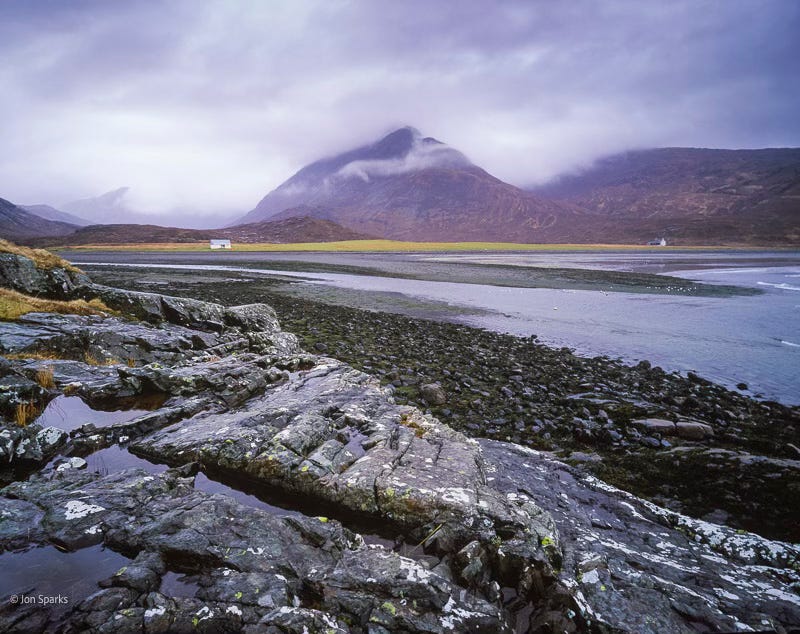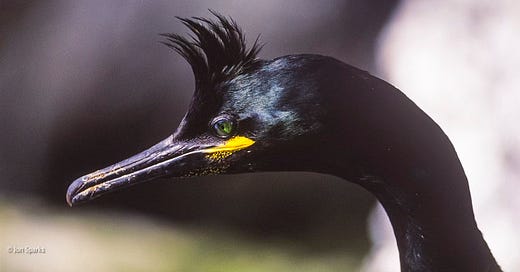Two themes seemed to be emerging in my Notes feed in the last week. First, several people linking to posts about the vapidity of ‘rules’ of writing—which I nodded along to and I may well come back to.
But then a second theme appeared, in two courageous and powerful posts, one by Tiffany Chu (Notes from the Town Hermit) and one by Elle (Postcards by Elle)—summed up in the line I’ve plagiarised for the sub-title of this post
I responded swiftly after the second in a reply and as a Note. Written in the heat of sympathetic indignation, I think it can still stand up as a launchpad for my own thoughts here.
Following yesterday, another powerful, rightly angry, and very courageous piece of work. As I said in response to Tiffany, I am not aware of being plagiarised in this way, but I have had to deal with the outright theft of my photographs on too many occasions. So I absolutely share Elle’s pain and and indignation. No, let’s say it: rage. I’m furious that people think it’s OK. I’m furious that people get mad at Elle for calling it out. (If people can’t see that it’s wrong, what hope is there of stemming the tide of industrialised plagiarism in the guise of ‘AI’?) I’m furious at people, like some I know personally, who would be up in arms if anyone stole their own work but can’t see any contradiction in using pirated software.
I think we all need to stand up and be counted and say this is not OK.
This is not OK: I could stop there and have said what I really needed to say. But a few more thoughts are lurking.
First, it’s not new. The internet, and the ease of copy/paste, may facilitate plagiarism (and outright theft). Though often commendable, the 'sharing' culture of social media may have blurred our understanding of the difference between sharing and stealing. But plagiarism has always existed, and if copyright theft was unknown it’s only because the word, and the concept, of copyright only fully emerged around the beginning of the 18th century. What may have been the world’s first Copyright Act, usually called the Statute of Anne, was passed by the British Parliament in 1710.
It certainly diminished the flow of copycat books, but pirate editions continued to proliferate in the USA, which took 80 years to pass its first copyright law.
Legislation can inhibit copying, but it’s never eliminated it. I heard tales in the 1980s of people who haunted the catwalks in London, Paris, and Milan with sketchbooks, or scrutinised the photos in the glossy mags, and within a couple of weeks cheap imitations of the couture outfits would be in the shops. Camera makers like Nikon began by copying German Leica and Contax cameras (but have, of course, gone on to be major innovators in their own right).
It’s not new, so all we can do is keep on calling it out.
In a reply to Tiffany Chu, I related my own experiences with plagiarism— from both sides. What follows is that reply, slightly expanded, and tweaked for greater clarity.
I’m not aware of plagiarism happening with my writing, but I’ve had parallel experiences with photos. Usually it’s outright theft, but I had one case where an image of mine was reproduced as a painting and used on the cover of a book. Since this was done by a company and for profit I didn’t play nice, but just sent them an invoice straight off; I did, though, remain scrupulously polite. There was some pushback, and they were nowhere near so polite, but when threatened with Small Claims Court (UK), they eventually paid up. By then I’d discovered that ‘artists’s reference’ is a recognised term so included that on the invoice; if nothing else it showed I’d done my homework
I’ve also been accused of perpetrating plagiarism. I’d taken a photo of Lancaster’s Ashton Memorial1 while working on commission for the agency that ran the Memorial and its surrounding park. When the image appeared in a brochure, I was accused of ‘copying’ it by an artist who was currently exhibiting a painting from the same spot in the building featured in both images.

I was somewhat flummoxed by this, especially by the word 'copy' being used. To copy her work I would need to have taken a photo of the painting itself. Obviously what she meant was that I’d plagiarised it.
Fortunately, I could prove that the photo had been taken well before the painting ever went on show, so if anyone had the right to call plagiarism it might be me, but I didn’t even consider it. There was one obvious spot to stand to get the best view, and the lighting would be best in the afternoon, so there was every reason to think the similarities were purely coincidental. Why she found that hard to accept I don’t know. I certainly don’t recall ever receiving anything like a proper apology for the unfounded accusation.
All this was unfortunate for Elaine2, the manager who’d commissioned me for the work, as was landed with the role of go-between. For me it was a very disturbing experience, and I still wonder how it might have played out if I hadn’t had proof I couldn’t have seen the painting beforehand.
Of course, as is often said, 'there’s no copyright in ideas', and there’s certainly no copyright in choosing a particular spot and time of day to take a photograph. That said, some people take it rather farther. There is a particular rock on the beach at Elgol on the Isle of Skye which has become known as the 'Joe Cornish boulder' after it appeared in a much-admired image by one of the UK’s leading landscape photographers. It’s had a magnetic appeal to photographers ever since; what concerns me is not the simple draw of a great location, but the documented fact that some photographers carry a copy of the original image and seek to exactly match Joe’s original composition. Is this plagiarism? Is it respectful homage? Is it, like an art student copying an Old Master to understand the brushwork, a fine way to learn?

If this case illuminates anything, it’s that it can be hard to determine exactly where plagiarism ends and inspiration begins. But this, it strikes me, is exactly the defence that was used in the case Elle recounts. And in this case it seems to me utterly spurious, though whether it’s offered cynically or out of self-delusion is harder to gauge.
'There’s no copyright in ideas'; sure. But there is copyright in how ideas are expressed. No one is going to say that JK Rowling 'stole' or committed plagiarism in using the idea of 'boy goes to wizarding school'. Whatever else you think of the relative merits of the books and their authors, Hogwarts is a very long way from Roke and from Earthsea3. But to take a series of thoughts and ideas fashioned into a complete whole and give them no more than a light dusting of paraphrase, as in Elle’s case; that’s plagiarism, and it’s not inconceivable that there could be a copyright case.
At this point in my first draft I launched into a bit of a rant about how many myths and misconceptions circulate about copyright (FFS, kids, it takes five minutes to find out that it’s not spelt 'copywrite'.) And all this is important, but I’d better save it for another day and stick to the matter of plagiarism, and my wish to stand in solidarity with Tiffany, and Elle, and everyone else who’s been on the wrong end of it.
As Elle says so perfectly: “If you do not have your own thoughts to post, don’t post at all.”
It’s not OK.
A well-known local landmark, and the place where I had my first photographic exhibition, way back in 1990.
In fact, IIRC, it was Elaine who suggested to me that I explore a specific bit of garden to find the view in question.
Anyone who’s been reading my posts for a while will know where I stand on Le Guin.





